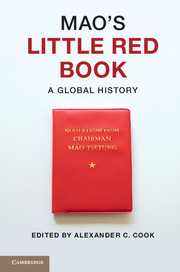Book contents
- Frontmatter
- Contents
- List of illustrations
- List of contributors
- Preface
- 1 Introduction
- 2 A single spark
- 3 Quotation songs
- 4 Mao quotations in factional battles and their afterlives
- 5 Translation and internationalism
- 6 Maoism in Tanzania
- 7 Empty symbol
- 8 The influence of Maoism in Peru
- 9 The book that bombed
- 10 Mao and the Albanians
- 11 Partisan legacies and anti-imperialist ambitions
- 12 Badge books and brand books
- 13 Principally contradiction
- 14 By the book
- 15 Conclusion
- Index
- References
8 - The influence of Maoism in Peru
Published online by Cambridge University Press: 05 June 2014
- Frontmatter
- Contents
- List of illustrations
- List of contributors
- Preface
- 1 Introduction
- 2 A single spark
- 3 Quotation songs
- 4 Mao quotations in factional battles and their afterlives
- 5 Translation and internationalism
- 6 Maoism in Tanzania
- 7 Empty symbol
- 8 The influence of Maoism in Peru
- 9 The book that bombed
- 10 Mao and the Albanians
- 11 Partisan legacies and anti-imperialist ambitions
- 12 Badge books and brand books
- 13 Principally contradiction
- 14 By the book
- 15 Conclusion
- Index
- References
Summary
The revolutionary war is a war of the masses; only mobilizing the masses and relying on them can wage it.
People’s WarPeru’s Maoist guerrilla movement, known as Shining Path, was far and away the most radical and violent in Latin America. The group’s founder and leader, Abimael Guzmán Reynoso, claimed to be a devoted Maoist and a faithful interpreter of Mao Zedong’s ideology, strategy, and tactics as he directed a people’s war based largely in rural, impoverished, and predominantly indigenous areas of Peru between 1980 and his capture in 1992.
However, Guzmán was trained in China as a potential Third World guerrilla during several extended visits beginning just before the Cultural Revolution (1966–76) and continuing during it, as were several other members of his organization. As a result, he and other Shining Path central committee members were much more influenced by the post-revolutionary ideological dogmatism of the Gang of Four than by Quotations from Chairman Mao, also known as the Little Red Book, or Mao’s reflections on the course of the Chinese revolution itself. However, by 1976 the Gang of Four had lost its struggle for political control in China, which meant that Shining Path was cast adrift and left to fend for itself.
- Type
- Chapter
- Information
- Mao's Little Red BookA Global History, pp. 130 - 146Publisher: Cambridge University PressPrint publication year: 2014

